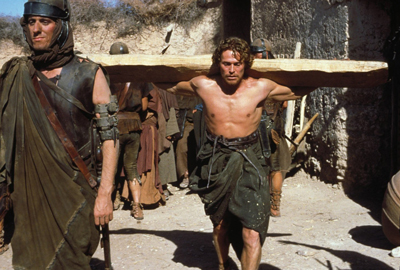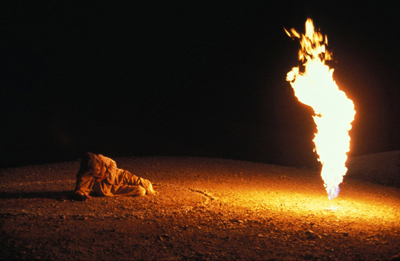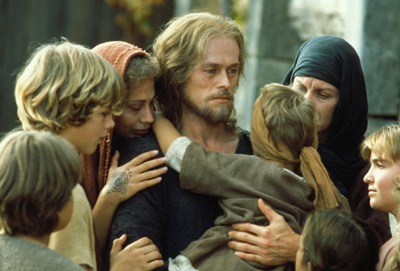
 |
|
|
|
Writing about politics in a review can be hazardous, as one's opinions will divide one's audience even when the intention is just to approach the film in question in an honest manner. I admire reviewers and critics that are unafraid to allow the reader to filter out the issue of bias on their own. Religious subjects are even more of a writer's minefield, for obvious reasons. For the record, I'm certainly not qualified to review Martin Scorsese's adaptation of Nikos Kazantzakis's The Last Temptation of Christ from any theological standpoint. But this film has been so thoroughly condemned by "religious authorities", sight unseen, that I think my simple reactions might be worthwhile. 
A title card informs us that the film's storyline is a fiction and not based on the Bible. The notion of Kazantzakis's book, carried over to the film, is that Jesus was not the quixotic inspired superman of some of the Gospels but a man unsure of his identity. This Jesus is seen to perform some miracles, but we're not certain that they are meant to be literal occurrences. Jesus is stricken with doubt and racked by normal human emotions, and yet is convinced that he's part of some inspired plan. He cannot decide if he's the Son of God or just a talented prophet, and he fears that his divine inspirations may be mere hallucinations. The familiar Bible events occur, but many are seen in a different light. This Jesus (Willem Dafoe, in an impressive and daring performance) makes crosses for the Roman crucifixions, debasing himself in search of spiritual humility. He's tempted by the tattooed Mary Magdalene (Barbara Hershey) and harshly criticized by Judas (Harvey Keitel) for not using his abilities to galvanize the public into revolt against the occupying Romans. Jesus comes off as an erratic prophet with an inconsistent message. He's an excellent inspirational speaker, yet in more than one gathering scoffers cause him to lose his grip on his audience. For a time he preaches rebellion, but his teachings -- almost always delivered in terms of parables or stories -- eventually counsel Love and Peace. Although some of the miracles and magic on screen may be happening only in Jesus' altered consciousness, it appears that he does raise Lazarus from the dead. Other miracles are not so definitive. At one point Judas is heard spreading a possibly invented story about his master feeding the multitudes. And what do we make of Jesus restoring an earlobe to a Roman soldier, after it's been lopped off by one of the disciples? 
The language of Jesus' words has been simplified; one achievement of Paul Schrader's screenplay adaptation is that the characters never sound stilted. The casting may lead one to think that Scorsese has assigned hip personalities to his supporting cast, but every performance is good. Keitel's Judas is some of his best work, and Harry Dean Stanton is very affecting as Saul, who becomes Paul. David Bowie's Pontius Pilate is only seen in long shot, quietly asking Jesus to perform a miracle while attending to his prize horses. André Gregory breaks with convention by portraying John the Baptist as a wild man, a prophet determined to stir up trouble. Unlike the noble Baptists of other Biblical epics, he seems the kind of provocateur that a Herod would have no choice but to lock up. This John seems to defer to the force of Jesus' personality, not to the notion that he is divine. Not unlike The Gospel According to St. Matthew by Pier Paolo Pasolini, The Last Temptation of Christ strips away the veneer of theatrical and filmic glamour that has become associated with the Passion Play. But the film's ending introduces something new, giving Jesus an experience shared by characters in Ambrose Bierce and Jorge Luis Borges. Agonizing on the cross, Jesus is visited by an angel who tells him that he's proved his worth to God. He no longer must die -- his crucifixion was a test similar to the one imposed on Abraham. Jesus then lives an entire ordinary life. He marries, has children, loses his first wife and lives with two other women. Judas didn't commit suicide; his betrayal in the garden had been at Jesus' command. As an old man, Judas confronts Jesus with that fact that he broke his promise by not dying and returning from the dead to save the world. And Judas has alarming news about Jesus' guardian angel as well... 
The message of The Last Temptation of Christ is not a radical departure from the official version; it confirms Jesus' identity as a supernatural being. Although in no way a Sunday School version of the Christ story, it is a religious work that seeks to reconcile Jesus' dual identity as mortal and divine. It's powerful, respectful, and it works. Works of art, plays and movies that offer alternative interpretations of sacred personages almost always meet resistance from some quarter or another. Luis Buñuel's surrealist movies are by definition committed to shock tactics. His blasphemous farce Simon of the Desert mocks a saint that seeks to emulate Christ, but Buñuel's strongest statement is still the debauched "laughing Christ" of his 1930 L'age d'Or. Buñuel's later critiques of the church were also highly intellectual, reasoned arguments, even when they sought to cast their subject in an absurd light. In America, author Ross Lockridge Jr.'s original novel Raintree County is packed with Melville-like digressions on various practical and abstract topics. One short chapter challenges the basis of Christianity with a blunt assertion: that Jesus was a half-crazy crackpot executed by the Romans, and that his mother and others made up a pack of lies about him after he was gone. Oral communication and credulous ignorance did the rest, and a religion was born. Frankly, seeing Raintree County resting undisturbed in my High School library convinced me that nobody in education was minding the store. The Last Temptation of Christ is in no way comparable to these purposely provocative works. The Last Temptation of Christ does have disturbing content, but only for viewers locked into a rigidly defined, church approved vision of Jesus. The Jesus of Kazantzakis and Schrader is not an inspired guru existing in serene isolation from his world, which is every bit as corrupt as our own. Jesus visits a brothel to talk to Magdalene and in an abstract fantasy he marries and fathers children, and eventually sleeps with other women as well. His ordinary domestic life is eventually revealed as a vicious trick engineered by his eternal enemy. The story ends in the traditional way, with the sense of a greater glory earned and understood. 
Scorsese's film took years to make, after a major false start. It was definitely designed to be challenging, but the outrageous protests engineered by a certain barnstorming faction of the religious right were unconscionable. Protests picketed the house of the head of Universal pictures and threatened theaters that dared to book it. The brief and limited release of The Last Temptation of Christ was affected by nothing less than religious terrorism, by people convinced that they "owned" the character of Jesus. When the film came to home video, the same forces made certain that rental chains were intimidated into keeping off the store shelves. Freedom of speech meets radical fundamentalism. 1 Criterion's Blu-ray of The Last Temptation of Christ is a beautiful Hi-Def return to one of their earlier releases. Michael Ballhaus' landscapes (filmed in Morocco) evoke the desert of the Holy Land, where only a hardy race of people could possibly survive. Peter Gabriel's creative music suggests a world far removed from our own, but similar in many ways. The extras are not many, but they get right to the point. The story of the film's long path to the screen is told in a commentary with Scorsese, Willem Dafoe, and writers Paul Schrader and Jay Cocks. An interview with composer Peter Gabriel examines the ancient instruments used for the film score. We also see quite a bit of VHS video shot on the Moroccan sets by Martin Scorsese, and galleries offer designs for the film's costumes and other research materials. The only outside critical commentary comes from the dauntless film critic David Ehrenstein, who doesn't mince words when he reports on the fundamentalist backlash against The Last Temptation of Christ. What I said about conscientious reviewers unafraid to offer their opinions certainly applies -- Ehrenstein's facts and reasoning are compelling.
On a scale of Excellent, Good, Fair, and Poor,
The Last Temptation of Christ Blu-ray rates:
Footnote:
1. I worked for a trailer house that in 1990 or 1991 took on the job to cut advertising materials for a movie called China Cry, an inspirational, anti-communist film produced and promoted by the Trinity Broadcasting Network. We visited the highly secure TBN headquarters in Orange County (that's another story); they liked our straightforward trailer cut. We were flabbergasted to see the trailer premiered on their afternoon TV show with the hosts (and Dale Evans) praying loudly for it to make more money than any movie in history. At the mix, a marketer (?) hired to shepherd the picture for TBN showed up to see the trailer completed. He impressed me as a man who could be selling used cars but had found a profitable niche in the Holy Racket. Every third sentence of praise for the trailer was a hearty, "It made a believer out of me!" He also boasted about how he had been hired to orchestrate a protest against The Last Temptation of Christ, which in his case was not a real grassroots campaign but a calculated attack to gain publicity for a Televangelist (not TBN). "We shut that sucker down!" he said, as if bragging about winning a basketball game. 1. Many thanks to correspondent Brent Spaulding for his corrections to my review.
Reviews on the Savant main site have additional credits information and are often updated and annotated with reader input and graphics. Also, don't forget the 2011 Savant Wish List. T'was Ever Thus.
Review Staff | About DVD Talk | Newsletter Subscribe | Join DVD Talk Forum |
| ||||||||||||||||||